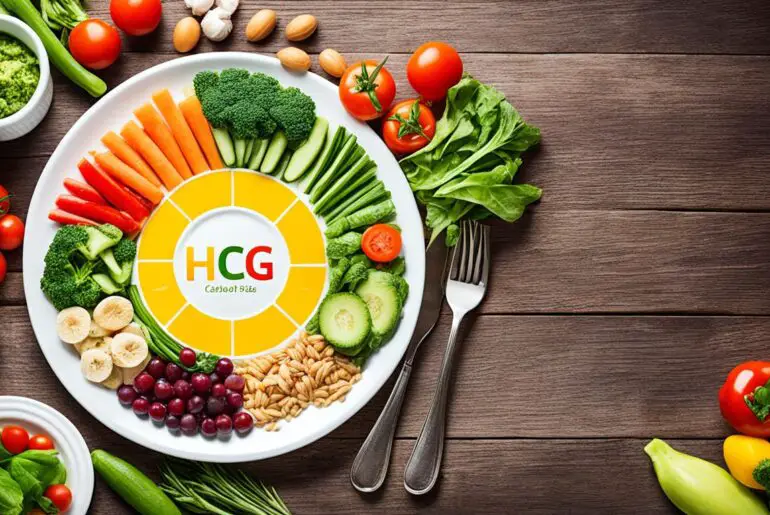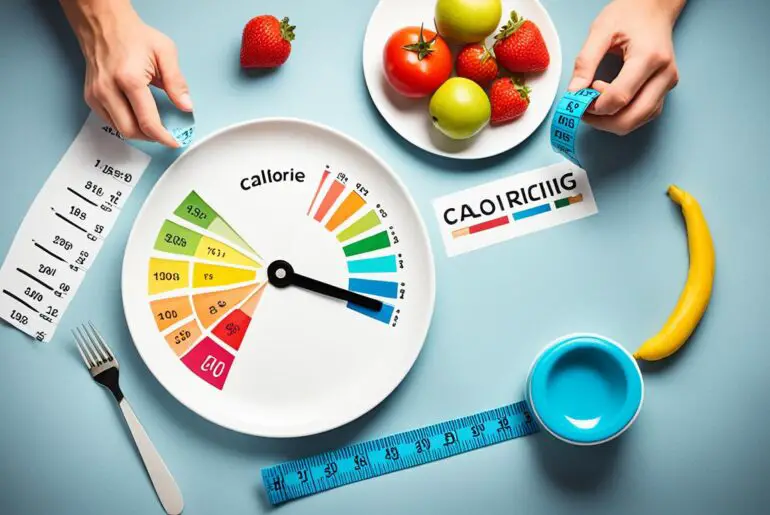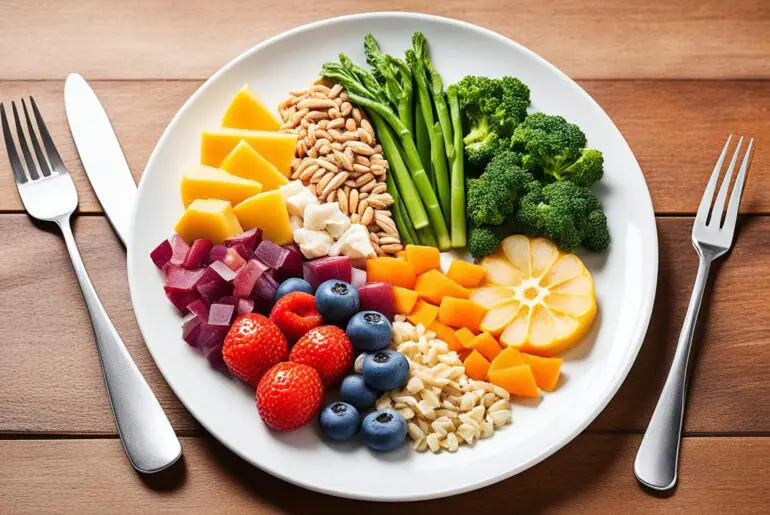Are you struggling to shed those extra pounds? The HCG diet has been touted as a quick and effective weight loss solution for women. But, is it really all it’s cracked up to be? In this article, we delve into the calorie intake recommended for women on the HCG diet and explore its safety and effectiveness. Get ready to uncover the truth behind this popular diet and discover alternative approaches to achieving sustainable weight loss.
Key Takeaways:
- The HCG diet restricts calorie intake to 500 to 800 calories per day for women.
- The use of HCG for weight loss is not supported by scientific evidence.
- The HCG diet may initially result in rapid weight loss, but it is not sustainable in the long term.
- The diet poses potential risks, including nutrient deficiencies and other diseases.
- There are safer and more effective approaches to weight loss for women that focus on long-term lifestyle changes.
What is the HCG diet?
The HCG diet is a weight loss program that combines a very low-calorie diet with HCG hormone injections. It was first introduced by a British physician in the 1950s and has gained popularity for its claim of promoting weight loss while preserving muscle mass. The diet involves strict calorie restrictions, typically ranging from 500 to 800 calories per day, and allows specific food choices, mainly lean proteins and low-carbohydrate fruits and vegetables.
The HCG diet follows the principle that the hormone, human chorionic gonadotropin (HCG), can help suppress appetite and target stubborn fat stores in the body. By combining HCG injections with calorie restrictions, it is believed that rapid weight loss can be achieved.
Proponents of the HCG diet claim that it not only helps with weight loss but also helps to reshape the body by targeting areas like the hips, thighs, and abdomen. However, it is important to note that these claims are not supported by scientific evidence.
“The HCG diet is an extreme form of calorie restriction that can lead to nutrient deficiencies and potential health risks.”
The HCG diet is typically divided into several phases, including a loading phase where individuals consume high-calorie foods for a few days, followed by a phase of severe calorie restriction and HCG injections. The diet also includes a maintenance phase where calorie intake gradually increases but remains significantly lower than average daily calorie needs.
Key points of the HCG diet:
- Very low-calorie diet combined with HCG hormone injections
- Calorie intake typically ranges from 500 to 800 calories per day
- Food choices primarily include lean proteins and low-carbohydrate fruits and vegetables
- Claims to promote weight loss while preserving muscle mass
- Lacks scientific evidence to support its effectiveness
| Pros | Cons |
|---|---|
| May result in rapid weight loss | Lacks scientific evidence |
| Promotes consumption of lean proteins and fruits/vegetables | Severe calorie restriction can lead to nutrient deficiencies |
| Offers a structured weight loss plan | Potential for muscle loss |
It is essential to approach the HCG diet with caution, as severe calorie restriction can lead to nutrient deficiencies and potential health risks. Before considering any weight loss program, including the HCG diet, it is advisable to consult with healthcare professionals or registered dietitians for personalized guidance and recommendations.
Is the HCG diet safe for women?
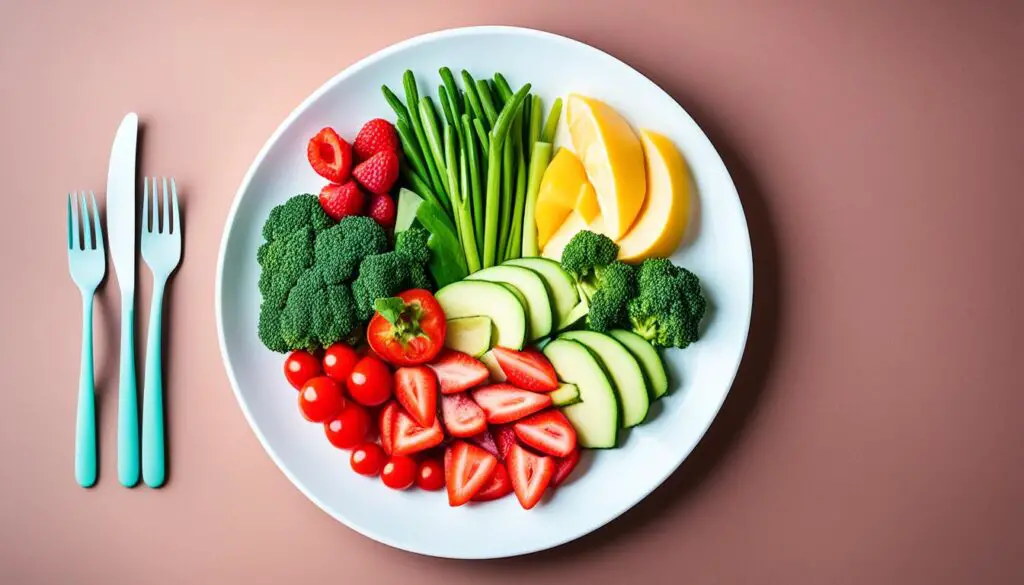
When considering the safety of the HCG diet, particularly for women, there are several concerns that health experts raise. The diet involves severe calorie restriction, typically ranging from 500 to 800 calories per day, which can lead to nutrient deficiencies and potential health risks. Women, in particular, need to ensure they are meeting their nutrient requirements to support overall health and well-being.
Common side effects of the HCG diet for women include fatigue, irritability, depression, and the potential for weight regain once the diet is discontinued. The extreme calorie restriction can negatively impact energy levels and mood, making it difficult to adhere to the diet long-term. Additionally, women may experience hormonal fluctuations and menstrual irregularities due to the significant calorie deficit.
It’s important to note that the use of HCG for weight loss is not approved by the FDA. The hormone is primarily prescribed for fertility purposes, and there is no scientific evidence supporting its effectiveness or long-term safety in the context of weight loss.
To illustrate potential risks, here are some key considerations for women on the HCG diet:
| Potential Risks for Women on the HCG Diet | Explanation |
|---|---|
| Nutrient Deficiencies | The severe calorie restriction and limited food choices can result in inadequate intake of essential vitamins, minerals, and macronutrients. |
| Hormonal Imbalances | The extreme calorie deficit can disrupt hormone production and lead to menstrual irregularities, mood swings, and other hormonal imbalances. |
| Metabolic Adaptation | Extended periods of severe calorie restriction can slow down metabolism, making it harder to maintain weight loss and potentially resulting in weight regain. |
| Muscle Loss | The lack of adequate protein and calories can cause muscle wasting, decreasing overall strength and metabolism. |
| Potential Weight Regain | Once the restricted calorie intake is discontinued, there is a high possibility of weight regain if healthy eating and exercise habits are not established. |
It is important for women to prioritize their health and well-being when considering weight loss strategies. The HCG diet’s extreme calorie restriction and use of unproven hormone injections raise red flags among healthcare professionals. Instead, women should focus on sustainable and balanced approaches to weight loss, incorporating regular physical activity and consulting with healthcare professionals or registered dietitians for personalized guidance.
Does the HCG diet lead to sustainable weight loss?
The HCG diet may initially result in rapid weight loss due to the drastic calorie restriction. However, this weight loss is not sustainable in the long term. The lack of scientific evidence supporting the HCG diet and its potential for nutrient deficiencies make it unlikely to lead to sustainable weight loss. The diet’s extreme calorie restriction can also slow down metabolism, making it more difficult to maintain weight loss.
While the HCG diet may seem appealing for its promise of quick results, it is important to consider the implications of such a low-calorie intake. Severely restricting calories can have adverse effects on the body, including muscle loss, nutrient deficiencies, and a decreased metabolic rate.
“The HCG diet’s extreme calorie restriction is not sustainable and can have detrimental effects on a person’s overall health and well-being. It is crucial to prioritize balanced nutrition and long-term lifestyle changes for sustainable and healthy weight loss.”
The human body requires a certain amount of calories to function optimally, varying based on factors such as age, gender, weight, and activity level. A diet that severely limits calorie intake, such as the HCG diet, may not provide the necessary nutrients and energy for the body to thrive.
Furthermore, the extreme calorie restriction of the HCG diet can lead to a slowed metabolism. When the body is not receiving enough fuel, it adapts by conserving energy, which can make it more difficult to maintain weight loss in the long term.
The Importance of Optimal Calorie Intake on the HCG Diet
Optimal calorie intake is crucial for overall health and sustained weight loss. While calorie restriction is a common approach to weight loss, it is important to strike a balance between reducing calories and ensuring the body receives adequate nutrition.
A calorie deficit is necessary for weight loss, but it should be achieved through mindful and healthy choices. Consulting with a registered dietitian or healthcare professional can help determine the optimal calorie intake for an individual’s specific needs and goals.
By following a well-rounded diet that includes a variety of nutrient-dense foods, such as fruits, vegetables, lean proteins, whole grains, and healthy fats, women can achieve sustainable weight loss while nourishing their bodies.
Additionally, incorporating regular physical activity into a weight loss regimen can further support overall health and contribute to a higher calorie burn.
Comparing Calorie Intake on the HCG Diet and Recommended Intake for Women
| HCG Diet | Recommended Calorie Intake for Women | |
|---|---|---|
| Calorie Range | 500-800 calories per day | Varies based on factors such as age, weight, and activity level |
| Nutrient Density | Low due to limited food choices | High when following a balanced and varied diet |
| Metabolic Impact | Potential slowdown due to extreme calorie restriction | Varies based on individual factors |
| Long-Term Sustainability | Unlikely due to limited food choices and potential nutrient deficiencies | Higher with a balanced approach and adequate nutrition |
Based on the comparison above, it is evident that the recommended calorie intake for women provides a more sustainable and balanced approach to weight loss compared to the extreme calorie restriction of the HCG diet.
Note: It is important to consult with a healthcare professional or registered dietitian before making any significant changes to your diet or starting a weight loss program.
What are the potential risks of the HCG diet for women?
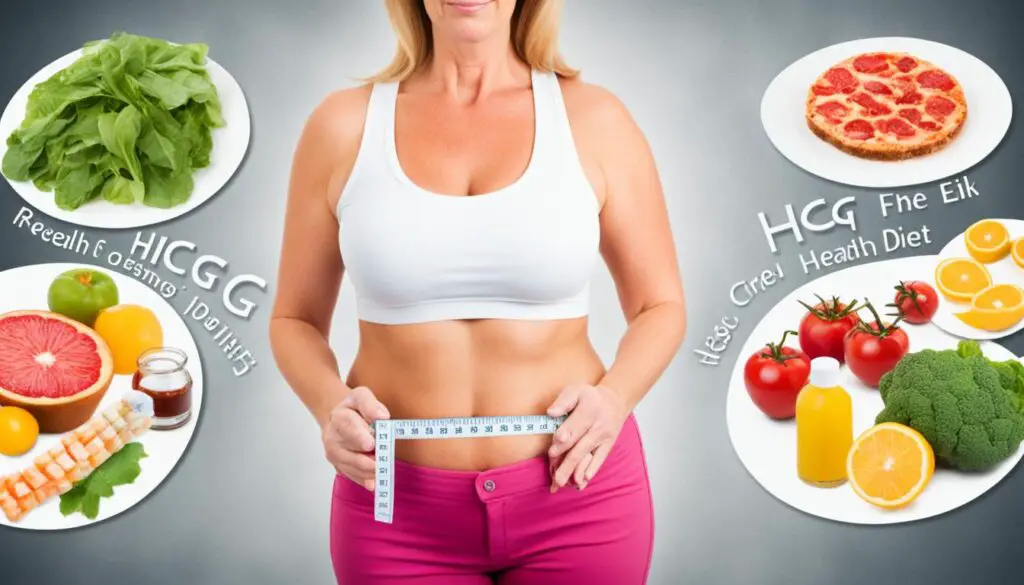
The HCG diet promises rapid weight loss, but it’s important for women to understand the potential risks associated with this extreme diet. With severe calorie restriction and the use of HCG hormone injections, the HCG diet poses various risks that can jeopardize women’s health.
Nutrient Deficiencies
One of the main risks of the HCG diet for women is the potential for nutrient deficiencies. With such a low-calorie intake, it can be challenging to meet the body’s nutritional needs. This can lead to deficiencies in essential vitamins, minerals, and macronutrients, which are necessary for overall health and wellbeing.
Gallstone Formation
Another risk is the formation of gallstones. Rapid weight loss, especially when accompanied by a low-fat diet, can increase the risk of developing gallstones. These small, hardened deposits can block the bile ducts and cause severe pain and other digestive complications.
Irregular Heartbeat and Electrolyte Imbalances
The HCG diet can also lead to irregular heartbeat and electrolyte imbalances in women. Severe calorie restriction can disrupt the body’s balance of electrolytes, such as sodium, potassium, and magnesium. This imbalance can affect the heart’s rhythm and lead to potentially dangerous cardiac issues.
Disordered Eating Behaviors
The extreme calorie restriction of the HCG diet can trigger the development of disordered eating behaviors in women. The obsessive focus on food and weight can lead to an unhealthy relationship with food, body image issues, and the potential for long-term psychological effects.
Increased Risk of Diseases
The HCG diet’s severe calorie restriction and potential nutrient deficiencies can increase the risk of various diseases in women. Women following this diet may be more susceptible to conditions such as cancer, diabetes, and heart disease due to inadequate nutrient intake and altered metabolic functioning.
In addition to these risks, the use of HCG injections in the HCG diet can cause side effects such as pain, bruising, infection, and allergic reactions. It is crucial for women to understand these potential risks and consult with healthcare professionals before considering or continuing with the HCG diet.
Is the HCG diet supported by scientific evidence?
The HCG diet, with its promise of rapid weight loss through severe calorie restriction and hormone injections, has gained popularity in recent years. However, when it comes to scientific evidence, the HCG diet falls short. Numerous studies have failed to prove its efficacy or safety, and registered dietitians unanimously agree that it is a dangerous approach to women’s weight loss. In fact, a 2016 article published in the Journal of Dietary Supplements concluded that there is no scientific support for the HCG diet and that its use can do more harm than good.
While proponents of the HCG diet claim that the hormone injections help preserve muscle mass and accelerate weight loss, these claims are not backed by robust scientific research. It is essential to note that the FDA has not approved the use of HCG for weight loss purposes. The diet’s severe calorie restriction, typically ranging from 500 to 800 calories per day, can lead to nutrient deficiencies and other health issues.
| Key Points | Explanation |
|---|---|
| No scientific evidence | No reliable studies have proven the effectiveness or safety of the HCG diet. |
| Potential harm | The use of HCG for weight loss is strongly discouraged by registered dietitians due to its potential risks. |
| Unapproved by the FDA | The FDA has not approved the use of HCG for weight loss purposes. |
| Severe calorie restriction | The diet’s calorie intake of 500 to 800 calories per day can result in nutrient deficiencies and other health issues. |
It is crucial to prioritize evidence-based approaches to women’s weight loss that prioritize overall health and well-being. Consulting with healthcare professionals or registered dietitians can provide guidance on safer and more effective ways to achieve sustainable weight loss.
The image above illustrates the potential risks and lack of scientific evidence surrounding the HCG diet for women.
Alternative approaches to weight loss for women

When it comes to women’s weight loss, there are safer and more effective alternatives to extreme diets like the HCG diet. These approaches focus on long-term, sustainable lifestyle changes rather than quick fixes. Incorporating the following strategies can help women achieve their weight loss goals:
- Follow a Balanced and Nutrient-Rich Diet: Instead of severely restricting calories, aim for a balanced diet that includes a variety of whole foods. Focus on lean proteins, fruits, vegetables, whole grains, and healthy fats. This ensures that you get all the necessary nutrients while managing your calorie intake.
- Incorporate Regular Physical Activity: Engaging in regular exercise not only aids weight loss but also improves overall health and well-being. Aim for a combination of cardiovascular exercise and strength training to maximize calorie burn and build lean muscle mass.
- Practice Portion Control: Pay attention to portion sizes and avoid overeating. Utilize techniques like mindful eating, listening to your body’s hunger cues, and using smaller plates to help manage portion sizes effectively.
- Seek Guidance from Healthcare Professionals or Registered Dietitians: Consulting with experts can provide personalized recommendations based on individual needs and goals. They can offer valuable advice, support, and accountability throughout the weight loss journey.
By adopting these alternative approaches, women can achieve sustainable weight loss while prioritizing their overall health and well-being. Instead of relying on extreme diets, focus on making gradual lifestyle changes that promote long-term success.
To illustrate the importance of these alternative approaches, here’s a comparison showcasing the potential benefits:
| Approach | Potential Benefits |
|---|---|
| The HCG Diet | – Severe calorie restriction – Rapid weight loss initially – Potential nutrient deficiencies – Potential muscle loss – Potential development of disordered eating behaviors |
| Alternative Approaches | – Balanced and nutrient-rich diet – Sustainable weight loss – Improved overall health – Enhanced well-being – Long-term success |
The role of calorie intake in weight loss

Calorie intake plays a significant role in weight loss, but extreme calorie restriction, as seen in the HCG diet, is not recommended. Very low-calorie diets like the HCG diet can lead to muscle loss, reduced metabolism, nutrient deficiencies, and other health risks. A more balanced approach to calorie intake, based on individual needs and goals, is crucial for long-term weight management and overall health.
When it comes to women’s health and calorie intake on the HCG diet, it’s important to understand the potential risks associated with extreme calorie restriction. While the HCG diet restricts calorie intake to a range of 500 to 800 calories per day, this level of restriction can have negative impacts on the body.
“Very low-calorie diets like the HCG diet can lead to muscle loss, reduced metabolism, nutrient deficiencies, and other health risks.”
The HCG diet calorie guidelines for women focus on severe calorie restriction, which can result in muscle loss. This is because the body turns to muscle tissue for energy when calories are limited. Muscle loss not only affects the body’s appearance but also slows down the metabolism.
In addition to muscle loss, extreme calorie restriction can lead to nutrient deficiencies. When calorie intake is severely limited, it becomes challenging to consume adequate amounts of essential nutrients such as vitamins, minerals, and protein. This can impact women’s overall health and well-being.
A balanced approach to calorie intake is crucial for long-term weight management and women’s health. Rather than following extremely low-calorie diets like the HCG diet, women should focus on consuming a variety of nutrient-dense foods that meet their individual needs.
| Key Points | Explanation |
|---|---|
| Extreme calorie restriction | Severely restricting calorie intake can lead to muscle loss and a reduced metabolism. |
| Nutrient deficiencies | Very low-calorie diets may not provide adequate amounts of essential nutrients, leading to potential health risks. |
| Balanced approach | Focus on consuming a variety of nutrient-dense foods that meet individual calorie and nutritional needs. |
In conclusion, while calorie intake is important for weight loss, extreme calorie restriction as seen in the HCG diet is not recommended for women’s health and long-term weight management. It is crucial to prioritize a balanced approach that includes a variety of nutrient-dense foods to meet individual needs and goals.
Expert opinions on the HCG diet for women
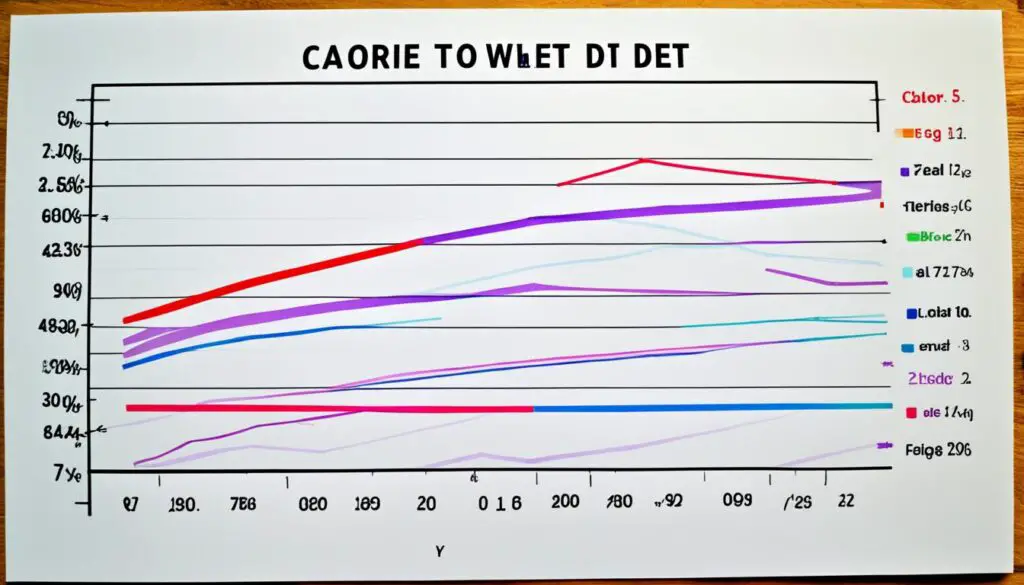
When it comes to the HCG diet for women, health experts, including registered dietitians, have consistently advised against its use. The lack of scientific evidence supporting its effectiveness and safety is a major concern. Additionally, severe calorie restriction and nutrient deficiencies can lead to potential risks and health complications.
“The HCG diet is not based on sound scientific principles. There is no evidence to support its claims of promoting weight loss or preserving muscle mass. In fact, the severe calorie restriction can result in muscle loss and a slower metabolism, making it difficult to maintain weight loss in the long run.” – Dr. Jessica Johnson, Registered Dietitian
These experts emphasize the importance of focusing on sustainable approaches to weight loss that prioritize overall health and well-being. Instead of resorting to extreme diets like the HCG diet, women should consider balanced nutrition, regular physical activity, and guidance from healthcare professionals or registered dietitians.
Adopting a holistic approach to weight management ensures that women can achieve their weight loss goals while maintaining good health and promoting long-term sustainable results.
Expert Recommendations for Calorie Management and Women’s Health
Healthcare professionals and registered dietitians recommend personalized calorie management strategies for women that align with their unique needs and goals. These strategies generally focus on:
- Consuming a balanced diet rich in essential nutrients
- Monitoring portion sizes to avoid excessive calorie intake
- Incorporating regular physical activity to support healthy metabolism and weight management
- Seeking guidance from professionals to develop an individualized plan
By following these expert recommendations, women can establish a healthy relationship with food, promote weight loss, and maintain overall well-being.
The Role of Calorie Management in Women’s Weight Loss
Calorie intake plays a significant role in weight loss, but extreme calorie restriction, as seen in the HCG diet, is not recommended for women due to the associated health risks and potential nutrient deficiencies. Instead, a balanced approach to calorie management on a suitable diet plan is crucial for long-term weight management and overall health.
Experts agree that a sustainable weight loss journey for women involves finding the right balance between calorie intake and expenditure, ensuring an adequate intake of essential nutrients, and establishing healthy habits that can be maintained over time.
| Benefits of Balanced Calorie Management | Risks of Extreme Calorie Restriction (HCG diet) |
|---|---|
|
|
The importance of sustainable weight loss strategies

In the journey towards weight loss, it is crucial for women to adopt sustainable strategies that promote long-term success. Extreme diets like the HCG diet, which restrict women’s calorie intake, may provide short-term results, but they are not sustainable in the long run. These diets often lead to a cycle of weight regain and can pose potential health risks. Instead, women should focus on creating a balanced and individualized approach to nutrition and physical activity that can be maintained for a lifetime.
By prioritizing sustainable weight loss strategies, women can achieve their desired weight goals while also maintaining their overall health and well-being. These strategies involve making gradual, healthy changes to their lifestyle, rather than resorting to extreme measures that are difficult to sustain.
A sustainable weight loss approach for women includes:
- Adopting a balanced and nutrient-rich diet: Women should focus on consuming a variety of whole foods, including fruits, vegetables, lean proteins, whole grains, and healthy fats. This ensures that their body receives all the essential nutrients it needs for optimal function.
- Managing calorie intake: Instead of severely restricting calorie intake, women should strive for a moderate calorie deficit that allows for steady and sustainable weight loss. This can be achieved by reducing portion sizes, making mindful food choices, and monitoring overall calorie consumption.
- Incorporating regular physical activity: Physical activity plays a vital role in weight loss and overall health. Women should engage in a combination of cardiovascular exercises, strength training, and flexibility exercises to promote calorie burn, build muscle, and improve metabolism.
- Practicing portion control: Portion control is key to maintaining a healthy weight. Women should be mindful of their portion sizes and avoid mindless snacking. Using smaller plates and bowls can help in managing portion sizes effectively.
- Seeking guidance from healthcare professionals or registered dietitians: Consulting with healthcare professionals or registered dietitians can provide personalized guidance and support in creating a sustainable weight loss plan that is tailored to individual needs and goals.
By following these sustainable weight loss strategies, women can achieve their desired weight loss goals while also nurturing their overall health. These methods promote long-term success by focusing on gradual, healthy changes that can be incorporated into their everyday lives.
A Comparison of Sustainable Weight Loss Strategies and the HCG Diet
| Sustainable Weight Loss Strategies | HCG Diet | |
|---|---|---|
| Calorie Intake | Gradual calorie deficit that promotes steady weight loss. | Severe calorie restriction to 500-800 calories per day. |
| Food Choices | Emphasizes a balanced diet with whole foods. | Restricts food choices and allows only specific foods. |
| Long-Term Sustainability | Focuses on sustainable lifestyle changes. | Not a sustainable approach. |
| Health Risks | Minimizes the risk of nutrient deficiencies and other health issues. | Potential for nutrient deficiencies and other health risks. |
| Overall Well-Being | Promotes both physical and mental well-being. | May result in mood swings, fatigue, and decreased well-being. |
The dangers of unregulated HCG products
It is important to be cautious when considering HCG products that are sold over the counter or online. These products are not regulated and may not contain the actual hormone. Using unregulated HCG products can pose additional risks to your health and weight loss journey.
One significant concern is that the ingredients of these unregulated products are unknown. Without proper regulations, there is no guarantee that these products are safe or effective. It is also important to note that the effectiveness of these products is not supported by scientific evidence.
Therefore, it is strongly recommended to avoid using unregulated HCG products for your weight loss efforts. Instead, consider consulting with healthcare professionals who can provide guidance and support in choosing a safe and effective weight loss program.
When it comes to your health, it’s crucial to prioritize safety and rely on evidence-based approaches that have been proven to be effective. Choosing a reputable weight loss program that takes into account your individual needs and goals is essential for long-term success.
Conclusion
The HCG diet is not a recommended approach for women’s weight loss. Despite its popularity, there is a lack of scientific evidence supporting its effectiveness or long-term safety. The severe calorie restriction and use of HCG hormone injections can lead to potential risks such as nutrient deficiencies, muscle loss, and the development of disordered eating behaviors.
Instead, women should focus on sustainable weight loss strategies that prioritize overall health and well-being. This includes following a balanced and nutrient-rich diet, incorporating regular physical activity, and seeking guidance from healthcare professionals or registered dietitians. These approaches promote long-term success and minimize the risks associated with extreme diets like the HCG diet.
It is important to prioritize your health and consult with professionals before considering any weight loss program. Remember, sustainable weight loss is achieved through a combination of healthy eating habits, regular exercise, and making lifestyle changes that can be maintained in the long term.
FAQ
What is the HCG diet?
The HCG diet is a weight loss program that involves a very low-calorie diet combined with HCG hormone injections. It restricts calorie intake to 500 to 800 calories per day and emphasizes specific food choices such as lean proteins and low-carbohydrate fruits and vegetables.
Is the HCG diet safe for women?
The safety of the HCG diet, particularly for women, is a concern among health experts. The severe calorie restriction and limited food choices can lead to nutrient deficiencies and potential health risks. It is not recommended by registered dietitians or healthcare professionals.
Does the HCG diet lead to sustainable weight loss?
The HCG diet may initially result in rapid weight loss due to drastic calorie restriction, but it is not sustainable in the long term. The lack of scientific evidence supporting the HCG diet and its potential for nutrient deficiencies make it unlikely to lead to long-term weight loss.
What are the potential risks of the HCG diet for women?
The HCG diet poses various risks for women, including nutrient deficiencies, gallstone formation, irregular heartbeat, electrolyte imbalances, disordered eating behaviors, and increased risk of conditions like cancer, diabetes, and heart disease.
Is the HCG diet supported by scientific evidence?
The use of HCG for weight loss is not supported by scientific evidence, and the FDA has not approved it for this purpose. A 2016 article published in the Journal of Dietary Supplements concluded that there is no scientific support for the HCG diet, and its use can do more harm than good.
What are the alternative approaches to weight loss for women?
Instead of resorting to extreme diets like the HCG diet, women should focus on balanced and sustainable approaches to weight loss. This includes following a nutrient-rich diet, incorporating regular physical activity, practicing portion control, and seeking guidance from healthcare professionals or registered dietitians.
What role does calorie intake play in weight loss?
Calorie intake plays a significant role in weight loss, but extreme calorie restriction, as seen in the HCG diet, is not recommended. Very low-calorie diets can lead to muscle loss, reduced metabolism, nutrient deficiencies, and other health risks. A balanced approach to calorie intake, based on individual needs and goals, is crucial for long-term weight management and overall health.
What do experts say about the HCG diet for women?
Health experts, including registered dietitians, strongly advise against the HCG diet for women. They highlight the lack of scientific evidence supporting its effectiveness and safety, as well as the potential risks associated with severe calorie restriction and nutrient deficiencies.
Why is sustainable weight loss important for women?
Sustainable weight loss strategies are essential for long-term success in women’s weight loss journeys. Extreme diets like the HCG diet are not sustainable and can lead to a cycle of weight regain and potential health risks. Emphasizing balanced and individualized nutrition and physical activity approaches that can be maintained for the long term is crucial.
What are the dangers of unregulated HCG products?
It is important to note that HCG products sold over the counter or online are unregulated and may not contain the actual hormone. These products may pose additional risks, as their ingredients are unknown and their effectiveness is not supported by scientific evidence. It is strongly recommended to avoid using unregulated HCG products and consult with healthcare professionals before considering any weight loss program.


